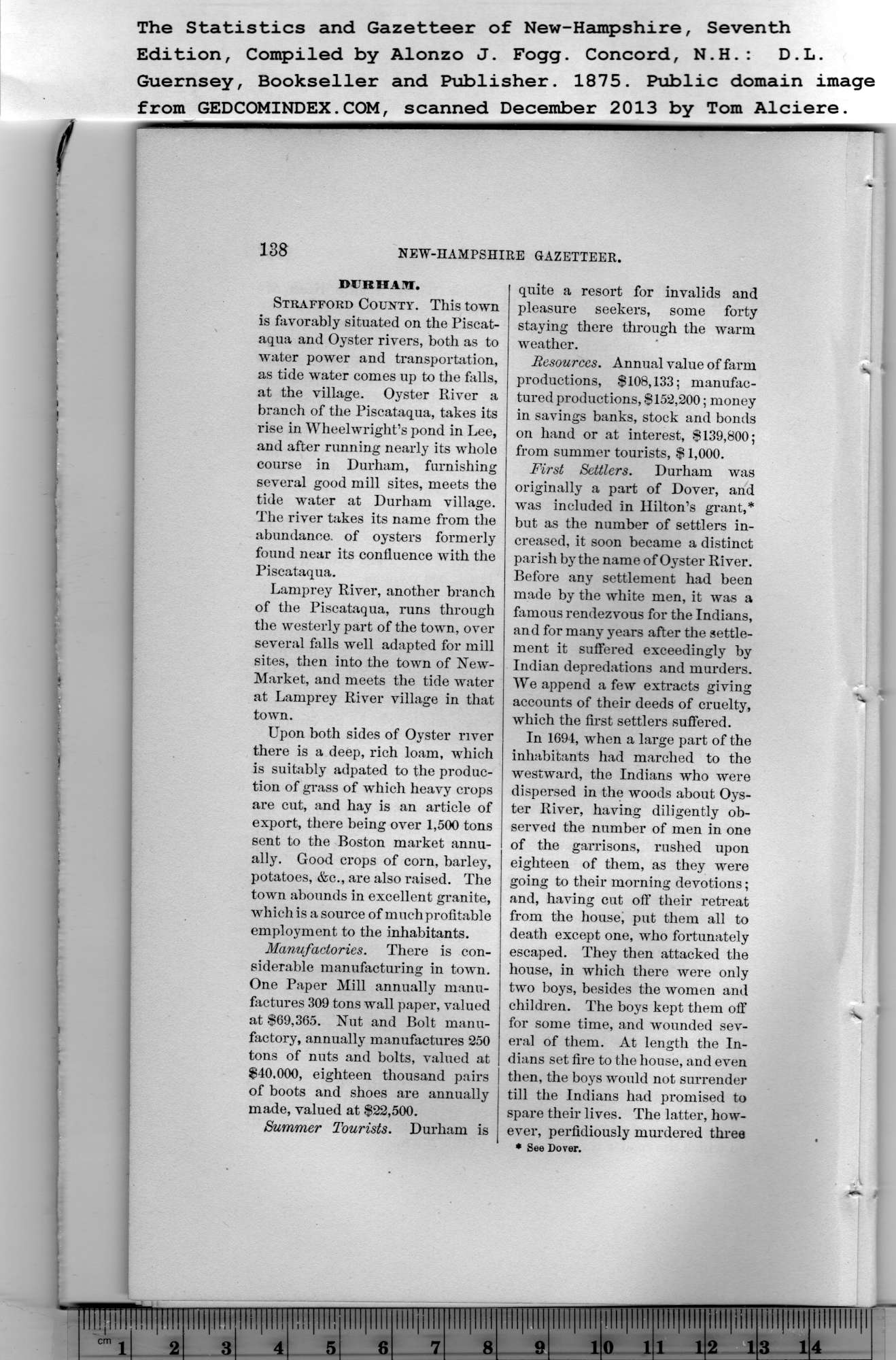|
DlRIIAil.
Strafford County. This town
is favorably situated on the Piscat-
aqua and Oyster rivers, both as to
water power and transportation,
as tide water comes up to the falls,
at the village. Oyster River a
branch of the Piscataqua, takes its
rise in Wheelwright’s pond in Lee,
and after running nearly its whole
course in Durham, furnishing
several good mill sites, meets the
tide water at Durham village.
The river takes its name from the
abundance, of oysters formerly
found near its confluence with the
Piscataqua.
Lamprey River, another branch
of the Piscataqua, runs through
the westerly part of the town, over
several falls well adapted for mill
sites, then into the town of New-
Market, and meets the tide water
at Lamprey River village in that
town.
Upon both sides of Oyster river
there is a deep, rich loam, which
is suitably adpated to the produc-
tion of grass of which heavy crops
are cut, and hay is an article of
export, there being over 1,500 tons
sent to the Boston market annu-
ally. Good crops of corn, barley,
potatoes, &c., are also raised. The
town abounds in excellent granite,
which is a source of much profitable
employment to the inhabitants.
Manufactories. There is con-
siderable manufacturing in town.
One Paper Mill annually manu-
factures 309 tons wall paper, valued
at $69,365. Nut and Bolt manu-
factory, annually manufactures 250
tons of nuts and bolts, valued at
$40,000, eighteen thousand pairs
of boots and shoes are annually
made, valued at $22,500. |
Bummer Tourists. Durham is
quite a resort for invalids and
pleasure seekers, some forty
staying there through the warm
weather.
Resources. Annual value of farm
productions, $108,133; manufac-
tured productions, $152,200; money
in savings banks, stock and bonds
on hand or at interest, $139,800;
from summer tourists, $ 1,000.
First Settlers. Durham was
originally a part of Dover, and
was included in Hilton’s grant,*
but as the number of settlers in-
creased, it soon became a distinct
parish by the name of Oyster River.
Before any settlement had been
made by the white men, it was a
famous rendezvous for the Indians,
and for many years after the settle-
ment it suffered exceedingly by
Indian depredations and murders.
We append a few extracts giving
accounts of their deeds of cruelty,
which the first settlers suffered.
In 1694, when a large part of the
inhabitants had marched to the
westward, the Indians who were
dispersed in the woods about Oys-
ter River, having diligently ob-
served the number of men in one
of the garrisons, rushed upon
eighteen of them, as they were
going to their morning devotions;
and, having cut off their retreat
from the house, put them all to
death except one, who fortunately
escaped. They then attacked the
house, in which there were only
two boys, besides the women and
children. The boys kept them off
for some time, and wounded sev-
eral of them. At length the In-
dians set fire to the house, and even
then, the boys would not surrender
till the Indians had promised to
spare their lives. The latter, how-
ever, perfidiously murdered three
* See Dover. |
